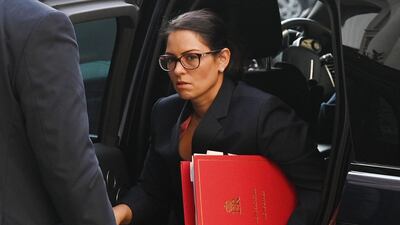Public venues in the UK would be legally required to prepare for terrorist attacks under new government proposals.
The proposal follows a campaign by Figen Murray, whose son, Martyn Hett, was killed in the 2017 Manchester Arena terrorist attack.
He was one of 22 people murdered when Salman Abedi detonated a bomb concealed in his backpack at the end of an Ariana Grande concert.
Ms Murray has since campaigned for Martyn's Law to provide more security at concert venues.
On Friday, the government launched a consultation on its proposed new law to improve protection security and preparedness at public places.
It would make it a legal requirement for public places to improve their safety and security.
Home Secretary Priti Patel said public safety must come first.
“I have heard first hand from those who have sadly lost loved ones in horrific terror attacks, and thank them for their tireless work to ensure others do not share their tragedy," Ms Patel said.
“This government has already taken significant steps to amend our powers and strengthen the tools for dealing with the developing terrorist threats we face, and we will always take the strongest possible action to protect our national security.
“That is why we want all organisations responsible for public venues and spaces to put public safety and security first.”
Ms Murray began campaigning for Martyn's Law after discovering that security at Manchester Arena was not increased after the attack.
"My husband and I were going to a music concert and I took a tiny bag so when my bag was searched it would be easy, and I wrongly assumed that security would be heightened everywhere," she said.
"Although I was told there would be concert security we walked straight in and nobody even checked our tickets. It shocked me to the core, it frightened me.
"I knew I needed to do something about this and I started up a petition. That was the start of Martyn's Law coming into play. I'm delighted the consultation is finally going ahead this week.
"It is a major stride towards making our country safer from terror attacks.
"To make Martyn’s Law a reality is a huge relief and I look forward to making a lasting difference with all of those who have supported it.”
The consultation will run for 18 weeks and will seek the public's views on to whom the duty should apply, what stakeholders will be required to do, how compliance should work and how the government can support it.
The intention is that the duty will apply to specified owners and operators of venues, large organisations and those responsible for public spaces.
The government's counter-terrorism police and business independent advisory group welcomed the move.
“It is in the public interest for the government and businesses to work together to ensure people are as protected as possible when visiting venues, retail areas and other publicly accessible spaces," it said.
"This initiative gives us an opportunity to make sure that we are doing all we can to keep people safe.
“We look forward to collaborating with the government in order to provide the public with the best possible protection against those who wish us harm.”
The government also launched the Manchester Arena public inquiry to examine the circumstances of the attack and whether any opportunities to prevent it were missed.
It was established by Ms Patel in October last year and is expected to run until spring.
Bomber Abedi, 22, died after detonating his rucksack bomb in a foyer of the arena at the end of the concert.
His younger brother, Hashem Abedi, was convicted last year on 22 counts of murder, one count of attempted murder and one count of conspiracy to cause an explosion.
He was jailed for a minimum of 55 years.


